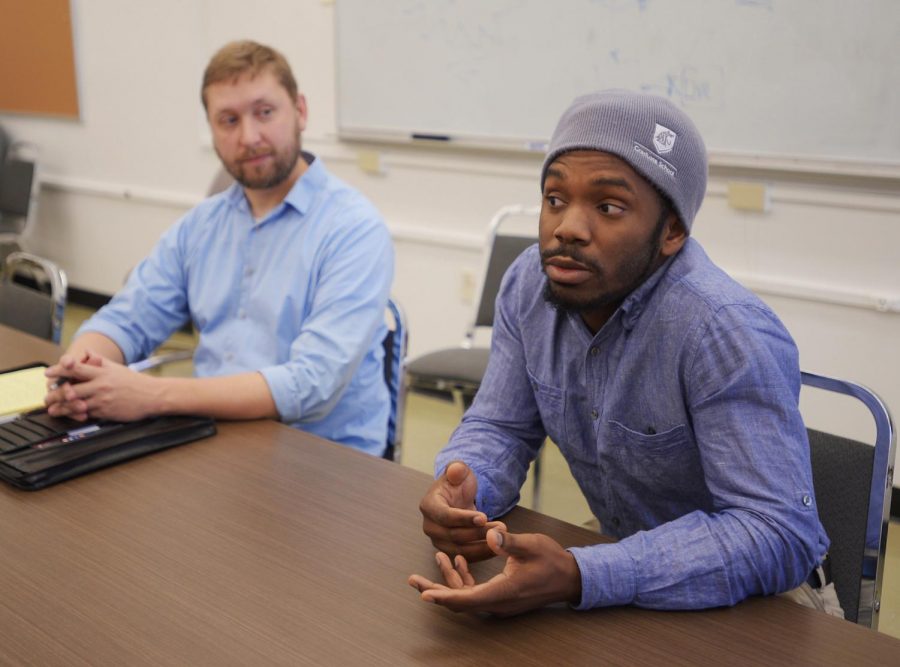Grad students’ stipends reduced
Engineering, architecture assistants lose income amid WSU budget crisis
JONI COBARRUBIAS | The Daily Evergreen
WSU graduate students Amir Gilmore, right, and Josh Munroe discuss how budget cuts will affect their way of life and expenses like rent and healthcare.
October 29, 2017
Hundreds of teaching and research assistants could lose about a sixth of their incomes, raising concerns that reducing stipends could become a standard practice for the university.
Early this month, about 350 teaching and research assistants in the Voiland College of Engineering and Architecture were notified that the college would reduce their minimum monthly stipends in an effort to comply with WSU President Kirk Schulz’s plan to get the university’s $30 million deficit under control.
Schulz did not call for stipend cuts, but did mandate that each college avoid running a deficit however it could.
Schulz provided more details of the spending reduction plan in a university-wide email last week, which included 2.5 percent cuts across the board, the elimination of the Performing Arts program and $10 million in spending cuts for three consecutive fiscal years.
The current monthly minimum stipend rate for graduate students is $2,057 and $2,207 for doctoral candidates. Come Jan. 1, those minimums will drop to $1,670 and $1,844 respectively, according to an email from Mary Rezac, dean of the Voiland College of Engineering.
Amir Gilmore, vice president of the Graduate and Professional Student Association, or GPSA, said the stipend cuts, slated to take effect Jan. 1, would have a severe impact on graduate students, especially because they were given such short notice.
“A student doesn’t even have time to prepare,” Gilmore said. “Everyone was kind of hit in the face by this.”
Teaching and research assistants get paid on a semester-by-semester basis. This complicates how graduate students finance yearlong leases, bills and family expenses many of them face while taking classes, holding other jobs and conducting their own research projects.
“All of these things they have to manage, now with less money,” Gilmore said. “They are just worried about what is happening and what can be done.”
GPSA President Shane Reynolds said reducing stipends would have an even worse impact on international students, many of which have families and children.
He said international students may not be permitted to work outside of the university, they may not be able to access their bank if it is sanctioned and they may not be able to get student loans.
“We have a grave concern for those students more so because of how vulnerable their position is to begin with,” Reynolds said. “This only makes it more difficult for them.”
Some domestic students would likely have to take out loans, Reynolds said, but he did not know how some international students would make ends meet.
“I am not too sure what some of the students are going to do,” he said. “There could be some that quit because they can’t afford it.”
Rezac, wrote in an email that she encouraged faculty to pay their assistants at a higher rate than the minimum. Rezac also encouraged schools and departments to award scholarships or other funds to supplement assistants’ stipends.
Josh Munroe, GPSA’s vice president of legislative affairs, said that he worried other colleges would consider cutting stipends. At a meeting with Schulz, Munroe said, the president shared concerns over the impact stipend cuts would have on graduate students.
“[Schulz] told us he is going to work as hard as he can to make sure this does not become a trend,” Munroe said.









